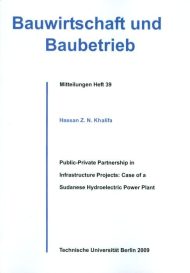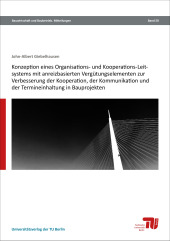Public private partnership in infrastructure projects – case of a Sudanese hydroelectric power plant

Size: 167 pages
Format: 14,8 x 21,0 cm
Format: 14,8 x 21,0 cm
Reihe: Bauwirtschaft und Baubetrieb. Mitteilungen ; 39
ISBN 978-3-7983-2181-6
5,00 €
Several external and internal factors have brought about the private participation in infrastructure projects since the early 1980s. The acute need for infrastructure and the lack of financial resources have led the government of Sudan towards the privatization of infrastructure. Began with the privatization of telecommunications and oil sectors, the process of privatizing infrastructure service provision in Sudan is still in its initial phases.
The government of Sudan intends to implement a number of power projects on the basis of PPP schemes (especially under BOT arrangements). Private power projects are exposed to a wide spectrum of risks. The expected risk usually determines the expected return. According to the CAPM theory, the higher the risk is, the higher is the expected return.
A Latin Hypercube simulation was applied to a real-life case study project to obtain the distribution of net present value of the project. Based on sensitivity analysis results, the projects net present values are high sensitive to the sale price and to the conversion factor (exchange rate). The may be significantly reduced by providing guarantees to the project company, on the other hand, a guarantee can be very expensive tool for the government, according to a case study, under a full tariff guarantee, the expected cost to the government is about 54% of the total project cost and the unexpected cost can reach to about 86% of the total project cost if the tariff adjustment delays for three years. The government has to choose the most appropriate guarantee type to be provided to project.
A survey targeted Investors, Government officials, and others revealed that the enhanced legal framework and the availability of government guarantees are considered as the most important factors at the country and sector levels. Adequacy of cash flows, and fair adjudication of tariff adjustment and dispute are considered as the most important factors to the success or failure of the private investment However, the government of Sudan is requested to achieve serious reforms to improve the future of the PPP in the power sector.



